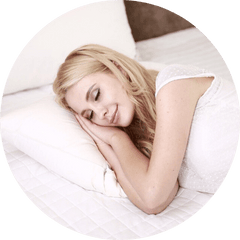Public Health France estimates that nearly 9 million people have experienced or experienced depression during their lifetime. This means that a person in seven declares to feel symptoms of stress and anxiety, which often cause sleep and insomnia disorders.
How does stress affect sleep?

Insomnia is a common sleep disorder caused by stress. Insomnia is defined as a constant difficulty in falling asleep, maintaining or improving the overall quality of sleep.
People with insomnia experience excessive drowsiness during the day, fatigue, irritability and other disorders when they are awake. According to modern estimates, 10 to 30% of adults suffer from insomnia.
What is insomnia?
Insomnia is a condition that prevents you from falling asleep or staying asleep after falling asleep.
There are different types of insomnia:
Acute insomnia
does not last long and is generally caused by something that happens in your life, like school difficulties with your child.
People with chronic or prolonged insomnia have sleep problems at least three times a week for three months or more.
Chronic insomnia
is due to bad sleep habits, offbeat work, various diseases and certain drugs.
Stress factors can be a major cause of chronic insomnia, as
- Problems or dissatisfaction at work
- Divorce and other conjugal or family difficulties
- The death of a loved one
- Serious illness or injury
- Critical changes in life
Not everyone develops chronic insomnia Due to constant stress, but people with anxiety disorders run a higher risk of developing symptoms of insomnia.
In addition, changes in sleep habits due to events or changes in life can also lead to insomnia.
This increases daily stress, which in turn worsens the symptoms of insomnia.
Other daily disorders associated with insomnia can cause or contribute to stress:
- Feel tired and uncomfortable
- Concentration difficulty
- Deterioration of social, family and professional relations
- Irritability and mood disorders
- Hyperactivity, aggressiveness, impulsiveness and other behavioral problems
- Decrease in energy and motivation
If a person has symptoms of insomnia for less than three months, the condition is called short -term insomnia.
Just like the chronic stress Can cause chronic insomnia, acute stressors can cause short -term symptoms of insomnia.
The short -term symptoms of insomnia can start to dissipate once the stressful situation is finished and that acute stress disappears.
However, some people fall into a vicious scheme of loss of sleep and daily anxiety, which ends up turning into chronic insomnia.
In addition to insomnia, chronic stress can lead to the sleep apnea.
This sleep disorder can cause severe snoring and suffocation episodes, as well as excessive daytime sleeping and other troubles during the day.
L' high blood pressure, heart disease, diabetes And other diseases that can often be attributed to stress are factors predisposing to sleep apnea.
THE overweight is also considered a major risk factor. Like insomnia, sleep apnea can exacerbate stress by disturbing your sleep and exhausting you during the day.
Does sleep help fight stress?

Sleeping enough every night can relieve stress fairly effectively. Unfortunately, good sleep can be difficult to get if you are stressed, especially if sleep problems are a major source of your daily concerns.
There are other measures you can take to reduce stress. These include regular exercise and maintaining a healthy support network from friends and family. However, moving stress often requires enough sleep.
Here are some ways to lower the level of anxiety:
Do the exercise regularly
Training also releases endorphins, hormones that can improve your mood. Yoga is one of the best ways to relax. Try to make 150 minutes of moderate physical activity, such as fast walking or bicycle, or 75 minutes of vigorous physical activity, such as race or swimming, every week.
Try meditation
Spend time during the day and before you sit down quietly and focus on your breathing. Inspire and simply exhale while thinking of a peaceful place or setting, such as the sun at sunset.
Make a list of things to do
Organize your thoughts by creating a list of things to do and prioritize what to be done and when. This alone can help relieve the anxiety you might feel by forgetting something important. Divide the larger tasks in smaller steps to avoid feeling outdated.
.
Talk to someone you trust
Talking to a family member, a friend or a therapist can calm you down; You may even have a new perspective on what concerns you.
:
How to sleep when you are stressed
Stress management is the key to a good sleep, and the way you manage stress may depend on your daily lifestyle.
In addition to having a balanced diet and exercising during the week, you can relieve stress with controlled breathing and other relaxation techniques.
A healthy balance between professional and privacy is also important, as is your ability to " relieve In a productive way stress in situations that cause it, and not at other times.
Sleep hygiene advice includes:
.
Keep a fixed schedule
It is important to keep the same hours of sleep and alarm clock (even on weekends) to regulate your circadian pace.
.
Take a judicious nap
Short naps, in moderation, can really improve your mood, performance and vigilance. If you need a nap, make sure it is early in the afternoon and does not exceed 30 minutes.
.
Testing devices with white noise sounds
Urban traffic and other strong noises can prevent you from falling asleep and wakeing up at night once you fell asleep.
.
Avoid stimulants
Like coffee, nicotine and screen use can activate your brain and prevent you from sleeping at night. Avoid drinks containing caffeine after 2 p.m., or six hours before going to bed.
.
Turn off your devices
Laptops, tablets, smartphones and televisions at least an hour before bedtime. Also get away from alcohol, which can fall asleep at first, but can interfere with the quality of sleep and wake up overnight.
.
Only use your room to sleep and make love
"Avoid things like working in the room" if you cannot fall asleep within 15 minutes, head to another room to read until you felt tired.
Keep your room fresh and dark it is easier to fall asleep and stay asleep if your room is cool and without light. Adjust your thermostat between 16 and 19 degrees. Put blinds or curtains that obscure light from the outside.
.
Can cannabidiol help sleep?

We have heard a lot about CBD oil, some companies saying that their products can work as a kind of miracle potion to sleep.
In truth, there is scientific evidence suggesting that the CBD can have a positive impact on sleep habits.
Is this good news for people with insomnia, but to what extent are the claims of CBD companies accurate?
Is the CBD really the ultimate remedy against insomnia, or a large part of what you have read is simply exaggerated?
It is estimated that around 1/4 of the French complain about lacking sleep, especially on work days, and that 1/3 declare to suffer from sleep disorders.
In recent years, several important studies have been published suggesting that the CBD may have potential to help regain sleep habits.
One of these studies , for example, highlighted the fact that the CBD reduced anxiety in 79% of the subjects tested and also had a positive short -term impact on sleep. Another one Even said that the CBD had potential to improve hyperactivity and sleep activity in children with autism spectrum disorder (ASD).
That said, it would always be irresponsible to conclude if the CBD can really act as a "miracle" sleeping pill.
All we can do at this stage is to examine the available research and draw our best conclusions.
Here are some of the most important studies that have been carried out in recent decades on the use of cannabis and sleep.
Research on the effects of CBD on insomnia and sleep problems
-
2017 Preliminary research on cannabis and insomnia suggest that cannabidiol (CBD) could have therapeutic potential for the treatment of insomnia. CBD can also be promising for disorders of paradoxical sleep behavior, as well as excessive diurnal drowsiness
-
2016 Due to its anxiolytic properties and the fact that CBD can help fight anxiety, the active compound can be effective in regulating sleep stability
How the CBD acts on sleep

If you have already done your own research on the CBD for sleep, you will not be surprised to learn that it does not work as do classic sleeping pills. In fact, some studies have suggested that it could actually be a slight stimulant.
So how could the CBD work to find a good night's sleep?
CBD is a 100% natural product present in the cannabis plant. This is called a "phytocannabinoid". This means that it belongs to a class of molecules of plant origin which interact with the receptors endocannabinoids in the human body.
These receivers belong to Endocannabinoid system of the body, or dry, which is responsible for many internal homeostatic functions.
As humans, each of us produces endocannabinoids - even if we have never consumed cannabis before in our lives.
Among other things, it has been shown that dry receptors influence things like mood, depression, anxiety, appetite and even pain and inflammation.
When there is a deficiency in the quantity of natural endocannabinoids in the body, one can suspect that one of these systems (or all) can be desynchronized.
CBD as an agent promoting sleep?

CBD oil seems to work by interacting with a network of receptors, proteins and other chemicals in the brain and peripheral tissues. This network is involved in many internal systems And plays a role in things like anxiety and sleep-wake cycles.
It is proven that the CBD could involve a physiological action inherent in obtaining a night of quality and healthy sleep.
Speaking of anxiety in particular, we know that this is one of the most common causes of insomnia and sleep deprivation.
In addition, we know thanks to user anecdotes that the calming effects of the CBD can be capable of:
- Increase the overall amount of sleep
- Reduce sleep disorders (difficulty falling asleep)
- Improve sleep quality
- Reduces insomnia
How can the cannabidiol that promotes vigilance, can he also provide better sleep?
It turns out that sleep-up cycles actually depend on our statement during the day . If you are the victim of insomnia, you (with millions of other people) know the feeling of being sleepy, tired and generally "badly in point" during the afternoon.
As you can imagine, it's wreaking havoc on your sleep-wake cycles. It is almost impossible to enter and maintain the non -paradoxical sleep you need at night.
To combat insomnia, try our formula at the CBD Good Dream ™!
Suffering from insomnia is not inevitable. As we have seen previously, in most situations insomnia can be resolved thanks to means to manage stress. But you can also in addition to relieve your stress problems thanks to the CBD oil to sleep Specially formulated to reduce your stress and thus reduce your tensions.